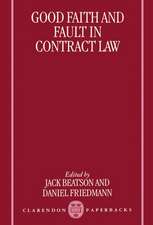The Effects of Financial Crises on the Binding Force of Contracts - Renegotiation, Rescission or Revision: Ius Comparatum - Global Studies in Comparative Law, cartea 17
Editat de Başak Başoğluen Limba Engleză Hardback – 4 mar 2016
Growing interconnectedness of global economies facilitates the spread of the effects of the financial crises. Financial crises cause severe difficulties for persons to fulfill their contractual obligations. During the financial crises, performance of contractual obligations may become excessively onerous or may cause an excessive loss for one of the contracting parties and consequently destroy the contractual equilibrium and legitimate the governmental interventions.
Uncomfortable economic climate leads to one of the most controversial dilemmas of the contract law: whether the binding force of the contract is absolute or not. In other words, unstable economic circumstances impose the need to devote special attention to review and perhaps to narrow the binding nature of a contract. Principle of good faith and fair dealing motivate a variety of theoretical bases in order to overcome the legal consequences of financial crises.
In this book, all these theoretical bases are analyzed with special focus on the available remedies, namely renegotiation, rescission or revision and the circumstances which enables the revocation of these remedies.
The book collects the 19 national reports and the general report originally presented in the session regarding the Effects of Financial Crises on the Binding Force of Contracts: Renegotiation, Rescission or Revision during the XIXth congress of the International Academy of Comparative Law, held in Vienna, July 2014.
| Toate formatele și edițiile | Preț | Express |
|---|---|---|
| Paperback (1) | 892.90 lei 6-8 săpt. | |
| Springer International Publishing – 7 apr 2018 | 892.90 lei 6-8 săpt. | |
| Hardback (1) | 898.89 lei 6-8 săpt. | |
| Springer International Publishing – 4 mar 2016 | 898.89 lei 6-8 săpt. |
Din seria Ius Comparatum - Global Studies in Comparative Law
- 18%
 Preț: 1584.40 lei
Preț: 1584.40 lei - 18%
 Preț: 1009.22 lei
Preț: 1009.22 lei - 18%
 Preț: 1573.51 lei
Preț: 1573.51 lei - 18%
 Preț: 1255.16 lei
Preț: 1255.16 lei - 24%
 Preț: 1515.12 lei
Preț: 1515.12 lei - 24%
 Preț: 802.76 lei
Preț: 802.76 lei - 15%
 Preț: 651.84 lei
Preț: 651.84 lei - 18%
 Preț: 958.56 lei
Preț: 958.56 lei - 24%
 Preț: 812.88 lei
Preț: 812.88 lei - 15%
 Preț: 653.33 lei
Preț: 653.33 lei - 15%
 Preț: 654.43 lei
Preț: 654.43 lei - 18%
 Preț: 1401.16 lei
Preț: 1401.16 lei - 18%
 Preț: 1007.80 lei
Preț: 1007.80 lei - 18%
 Preț: 956.99 lei
Preț: 956.99 lei - 18%
 Preț: 789.98 lei
Preț: 789.98 lei - 15%
 Preț: 644.95 lei
Preț: 644.95 lei - 18%
 Preț: 953.97 lei
Preț: 953.97 lei - 18%
 Preț: 1009.85 lei
Preț: 1009.85 lei - 18%
 Preț: 955.08 lei
Preț: 955.08 lei - 18%
 Preț: 2787.02 lei
Preț: 2787.02 lei - 18%
 Preț: 1010.03 lei
Preț: 1010.03 lei - 18%
 Preț: 1403.67 lei
Preț: 1403.67 lei - 18%
 Preț: 2114.90 lei
Preț: 2114.90 lei - 18%
 Preț: 2107.49 lei
Preț: 2107.49 lei - 18%
 Preț: 997.71 lei
Preț: 997.71 lei - 18%
 Preț: 955.40 lei
Preț: 955.40 lei
Preț: 898.89 lei
Preț vechi: 1096.21 lei
-18% Nou
Puncte Express: 1348
Preț estimativ în valută:
172.06€ • 186.96$ • 144.62£
172.06€ • 186.96$ • 144.62£
Carte tipărită la comandă
Livrare economică 21 aprilie-05 mai
Preluare comenzi: 021 569.72.76
Specificații
ISBN-13: 9783319272542
ISBN-10: 3319272543
Pagini: 333
Ilustrații: XIX, 333 p. 2 illus.
Dimensiuni: 155 x 235 x 21 mm
Greutate: 0.67 kg
Ediția:1st ed. 2016
Editura: Springer International Publishing
Colecția Springer
Seria Ius Comparatum - Global Studies in Comparative Law
Locul publicării:Cham, Switzerland
ISBN-10: 3319272543
Pagini: 333
Ilustrații: XIX, 333 p. 2 illus.
Dimensiuni: 155 x 235 x 21 mm
Greutate: 0.67 kg
Ediția:1st ed. 2016
Editura: Springer International Publishing
Colecția Springer
Seria Ius Comparatum - Global Studies in Comparative Law
Locul publicării:Cham, Switzerland
Public țintă
ResearchCuprins
Part I General Report.- 1 General Report on the Effects of Financial Crises on the BindingForce of Contracts: Renegotiation, Rescission or Revision; Rona Serozan.- Part II National Reports.- 2 From Crisis to Crisis: Weakness of Contracts in Argentina; Julio CésarRivera.- 3 Keeping the Balance: The Effects of Financial Crises on Contractsunder Brazilian Law; Anderson Schreiber.- 4 Les effets exercés par les crises financières sur la forceobligatoire des contrats: certitudes et incertitudes du droit québécois enmatière d’imprévision; Élise Charpentier and Nathalie Vézina.- 5 Can Financial Crisis Lead to the Application of the Institute ofChanged Circumstances under Croatian Law?; Maja Bukovac Puvača, Gabrijela Mihelčićand Iva Tuhtan Grgić.- 6 Elimination of the Impacts of Financial Crisis on Legal Relationshipsaccording to Czech Private Law; Marketa Selucká.- 7 Financial Crises and Danish Contract Law: No Room for Hardship; MadsBryde Andersen and Joseph Lookofsky.- 8 Crises financières et contrats: le droit français refuse la révisiond'un contrat devenu déséquilibré; RémyCabrillac.- 9 Financial Turmoil as a Change of Circumstances under Greek ContractLaw; Nikolaos A. Davrados.- 10 “All Roads Lead to Rome”: The Multiple Grounds under Italian Law toChallenge a Contract Due to Supervening Changes of Circumstances; MarcoTorsello.- 11 Effects of a Bubble Economy on the Binding Force of Contracts:The 1990s Experience of Japan and ItsImplications; Shugo Kitayama.- 12 The Effects of Crises on the Binding Force of Contracts – PolishSolutions; Wojciech Robaczyński.- 13 Discussing the (Ab)Normality of Financial Crises as a RelevantChange of Circumstances Under Portuguese Law; Manuel Carneiro da Frada andMariana Fontes da Costa.- 14 L'imprévision dans le Nouveau Code Civil roumain enfanté par lacrise économique mondiale; Dumitru Dobrev and Marilena Uliescu.- 15 The Russian Federation Legislation on the Effects of Financial Criseson the Binding Force of Contracts: Renegotiation, Rescission or Revision; NataliaGeorgievna Doronina and Natalia Guennadievna Semilyutina.- 16 The Effects of the Global Financial Crisis on the Binding Force ofContracts: A Focus on Disputes over Structured Notes in Taiwan; Chang-hsienTsai.- 17 Certainty over Clemency: English Contract Law in the Face ofFinancial Crisis; Horace Yeung and Flora Huang.- 18 Financial Crisis and the Remedy of Rescission in the United States;Aditi Bagchi.- 19 The Adaptation of the Contract in Turkish Law; Başak Baysal.- Index.
Textul de pe ultima copertă
This bookis about one of the mostcontroversial dilemmas of contract law: whether or not the unexpected change ofcircumstances due to the effects of financial crises may under certain conditionsbe taken into account.
Growinginterconnectedness of global economies facilitates the spread of the effects ofthe financial crises. Financial crises cause severe difficulties for persons tofulfill their contractual obligations. During the financial crises, performanceof contractual obligations may become excessively onerous or may cause anexcessive loss for one of the contracting parties and consequently destroy thecontractual equilibrium and legitimate the governmental interventions.
Uncomfortableeconomic climate leads to one of the most controversial dilemmas ofthe contract law: whether the binding force of the contract is absolute or not.In other words, unstable economic circumstances impose the need to devotespecial attention to review and perhaps to narrow the binding nature of a contract.Principle of good faith and fair dealing motivate a variety of theoretical bases in order to overcomethe legal consequences of financial crises.
In thisbook, all these theoretical bases are analyzed with special focus on theavailable remedies, namely renegotiation, rescission or revision and thecircumstances which enables the revocation of these remedies.
The book collects the 19 national reports and the generalreport originally presented in the session regarding the Effects of Financial Crises on the Binding Force of Contracts: Renegotiation,Rescission or Revision during the XIXth congress of the InternationalAcademy of Comparative Law, held in Vienna, July 2014.
Growinginterconnectedness of global economies facilitates the spread of the effects ofthe financial crises. Financial crises cause severe difficulties for persons tofulfill their contractual obligations. During the financial crises, performanceof contractual obligations may become excessively onerous or may cause anexcessive loss for one of the contracting parties and consequently destroy thecontractual equilibrium and legitimate the governmental interventions.
Uncomfortableeconomic climate leads to one of the most controversial dilemmas ofthe contract law: whether the binding force of the contract is absolute or not.In other words, unstable economic circumstances impose the need to devotespecial attention to review and perhaps to narrow the binding nature of a contract.Principle of good faith and fair dealing motivate a variety of theoretical bases in order to overcomethe legal consequences of financial crises.
In thisbook, all these theoretical bases are analyzed with special focus on theavailable remedies, namely renegotiation, rescission or revision and thecircumstances which enables the revocation of these remedies.
The book collects the 19 national reports and the generalreport originally presented in the session regarding the Effects of Financial Crises on the Binding Force of Contracts: Renegotiation,Rescission or Revision during the XIXth congress of the InternationalAcademy of Comparative Law, held in Vienna, July 2014.
Caracteristici
Provides a comprehensive comparative overview on the legal consequences of global financial crises on the binding force of contracts Explores the problem from a variety of theoretical bases and concise analysis of the law of 19 jurisdiction Focuses on possible available remedies, namely renegotiation, rescission and revision









